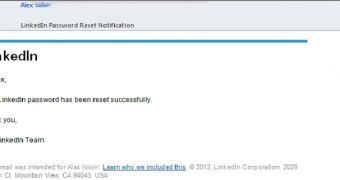LinkedIn has been busy in the past few days alerting 6.5 million of its customers to the fact that their passwords must be reset because of an incident. However, the notification process isn’t going as smoothly as it should.
First, Bitdefender experts reported that some of the messages were sent to email addresses not associated with the affected account. They believed that the practice represented an unnecessary activity disclosure.
Soon after that, some of our readers complained that the notifications were “poorly worded” and did not contain any precise information on what had actually happened. Furthermore, many people were not aware of the incident, so they ignored the emails.
This final point is highlighted by Cloudmark’s research team, who recorded on Friday a considerable increase in user spam reports relating to the password reset notifications from LinkedIn.
“These were not because spammers were trying to take advantage of the publicity around the Linkedin fail; those emails are stopped by our regular filters and never make to the users,” Andrew Conway explained.
“No, this was a real email from Linkedin telling people whose password had been compromised how to protect their account. Over four percent of the people receiving this email, thought it was spam and sent it straight to the bit bucket.”
From their calculations it results that around 250,000 individuals saw the notifications and immediately marked them as spam.
The conclusion of this incident is that companies who send out too many emails considered to be insignificant by their customers may be ignored in case of an unfortunate situation such as this one.
Of course, LinkedIn users could have easily unsubscribed, or they could have configured their messages settings to stop receiving alerts that didn’t represent an interest.
However, as Cloudmark experts reveal, because the opt-out links are hard to notice or inexistent, members simply preferred to mark all the emails as spam, including the ones that came with the precious password reset instructions.

 14 DAY TRIAL //
14 DAY TRIAL //